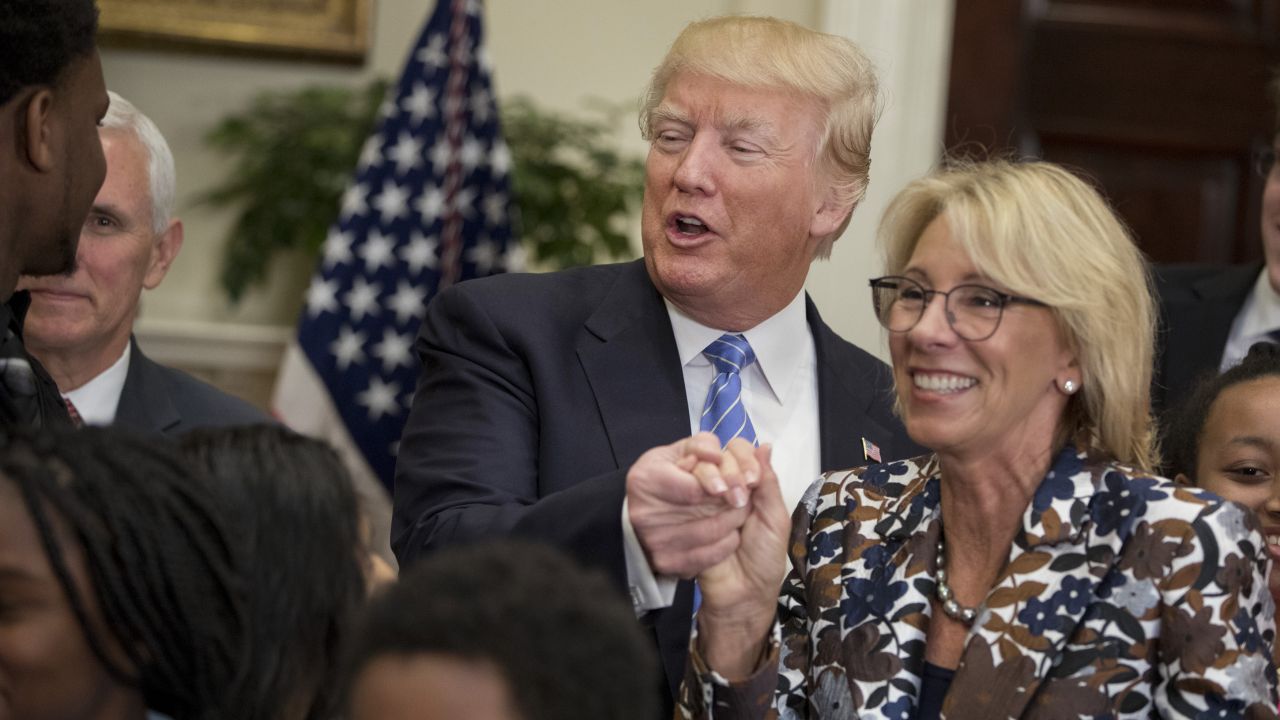
U.S. President Donald Trump, center, shakes hands with Betsy DeVos, U.S. secretary of education, right, during an event for School Choice in the Roosevelt Room at the White House in Washington, D.C., U.S., on Wednesday, May 3, 2017. Trump welcomed Palestinian Authority leader Mahmoud Abbas to the White House on Wednesday as the U.S. president weighs how to approach a Middle East conflict that has eluded resolution for seven decades. Photographer: Aaron P. Bernstein/Bloomberg via Getty Images
This post originally appeared at Education Opportunity Network.
The vision of “education reform” coming from the Trump administration and Secretary of Education Betsy DeVos entails cutting direct aid to students, especially those from low-income families, in order to expand the private sector’s financial footprint in education.
That at least is what’s reflected by a leaked budget document obtained by The Washington Post.
As The Post reports, deep spending cuts — a net $9.2 billion or 13.6 percent — called for in the document sever funding to many “long-standing programs” and federal government supports that largely serve children and youth from low-income households. At the same time, more money would go to incentivize “alternatives to traditional public schools” at the K-12 level and increase the costs of college loans, a federal program with significant ties to the financial services industry.
A glaring example of this pivot to the private sector is the plan’s cuts to programs that make public schools attractive options for parents, especially in low-income communities, while boosting federal support for “school choice” that incentivizes parents to turn to charter schools and private schools instead.
For instance, $1.2 billion for after-school programs would be eliminated — so would $2.1 billion for teacher training programs that lead to class-size reductions in schools. Funding that supports arts education, international studies and foreign languages get the axe. Federal help for educating Alaska Native and Native Hawaiian students and gifted students are killed. A $400 million fund to pay for an array of school-enriching services and academics — such as mental-health support, anti-bullying programs and advanced courses — gets zero. Even money for Special Olympics education programs would be gone.
Also under the proposed budget, schools would get a lot less money from the federal government for technical education, adult basic literacy instruction and a program started by the Obama administration to support for children in needy communities.
In the meantime, Trump and DeVos would take $1 billion out of the federal government’s Title I funds — money sent to the states to support educating poor children — to a new grant program that incentivizes those states to fund the competitive privately operated schools such as charters and religious schools. The grant program, The Post explains, is called Furthering Options for Children to Unlock Success (FOCUS) that only goes to school districts that “agree to allow students to choose which public school they attend — and take their federal, state and local dollars with them.”
This proposal, often called “Title I portability,” was proposed by Republicans during the Obama administration and met significant opposition from Democrats. The Center for American Progress called the scheme “Robin Hood in reverse” and declared, “Portability actually drives resources away from high-poverty districts and into more affluent ones.”
Nevertheless, Title I portability is based on the general principle that education funding should “follow the child” — a misguided practice many Democrats espouse also — so it continues to live on in the foundation of all school choice initiatives.
In addition to this diversion of K-12 public tax dollars to privately operated schools, the proposed budget provides “$500 million for charter schools, up 50 percent over current funding,” and an outlay of $250 million for grants that would ”pay for expanding and studying the impacts of vouchers for private and religious schools.
As the Post reporters explain, “It’s not clear how much would be spent on research versus on the vouchers themselves.” But what’s also unclear is how one studies the “impacts” of an initiative simultaneously as it rolls out. Rather than a research endeavor, this additional money sounds more like it’s for a marketing program.
For higher ed, “The proposed budget would also reshape financial aid programs that help 12 million students pay for college,” The Post says.
The “reshaping” includes cutting loans and work-study programs for disadvantaged students and ending subsidized loans for students still in schools and the program that forgives college loans for students who eventually take jobs in the public sector.
Eliminating these student loan programs means “the government could eventually make more money off of student loans” The Post reports in a sidebar to its main article. But mot only is it ethically problematic for our government to treat college students like cash cows; it’s also just another way to ensure more money for education is directed to the immense financial empire that profits off servicing those loans, refinancing the debt and collecting on loans that go into default.
Not many people who’ve already had a chance to comment on this education budget, including Post reporters who brought it to light, think it has much of a chance of getting through Congress.
The circus of scandal that is sidetracking the Trump administration’s plans for tax reform, health care and infrastructure may thwart any progress on his education plan too. But let’s be clear that this budget reflects the education values that have guided, for years, an agenda to privatize public education.




